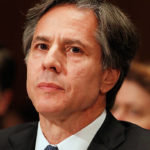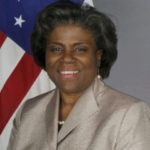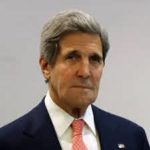Check out the website: https://lenspoliticalnotes.com Look at the recent Political Notes and Len’s Letters on the website.
Political Note #341 US and the World: Blinken, Thomas-Greenfield, and Kerry
2020 Post Election
Joe Biden is gradually introducing who we will be governed by. Asked why he was beginning with National Security Leaders, Joe Biden answered “Because it is National Security.” These people, like Joe Biden’s other picks, are a mixture of old hands he has relied on for years and old hands the country has relied on for years. Will there be some new faces popping up? Not so far.
Secretary of State

Joe Biden has nominated Antony Blinken to be Secretary of State. The Secretary of State advises the President about the United States’ relationship with other countries, helps develop that policy and implements the policies that are developed. The implementation is through the United States’ foreign service which the Secretary of State oversees.
In rank, the Secretary of State is first after the President and Vice President. No longer, but the Secretary of State used to be the second in line to the Presidency after the Vice President.
Antony Blinken is well situated for the role – personally and professionally. Start with the personal. He is a New Yorker. His great grandfather Meier Blinken was a well-known Yiddish author from Kiev. His grandfather moved the family to the United States from Kiev and his father, Donald Blinken, was a founder of E. M. Warburg Pincus and Company – investment bankers. Antony Blinken attended the well known progressive Dalton School in the Upper East Side of New York for a few years. He left at the age of nine after his parents divorced. His mother, born Judith Frehm, married Samuel Pisar, a Holocaust survivor who lived in France. Antony Blinken completed his schooling in Paris, learning from his bilingual private school, from his mother and stepfather, and the world they introduced him to.
Samuel Pisar described himself as having been a feral youth, surviving Auschwitz by being “pitiless and cruel,” creating an aura of privilege in the camp, and, ultimately, running away from a death march. Immediately after the war, he lived on theft and the black market until rescued by a French aunt. He left for Australia for his BA, continued to the US and Harvard for his law degree, and became a lawyer to stars and corporate leaders, and became an advisor to French and American politicians and presidents. At home in Paris, he added a PhD from the Sorbonne. Tony Blinken learned about a complex world from from investment banker father, from Pisar, and from his mother, who once served as Music Director for the Brooklyn Academy of Music and later managed Merce Cunningham’s Dance Company,
Tony Blinken left Paris for his BA at Harvard and his JD at Columbia Law School. The year he graduated from law school, his investment banker father was an advisor to and fundraiser for Michael Dukakis’s presidential; campaign. Tony joined him to work the fundraisers.
Six years later, having practiced law in the US and in France, Tony Blinken joined Bill Clinton’s National Security Council Staff. In 1999, he became a Special Assistant to the President. Shortly after the end of the Clinton Presidency, Tony Blinken made the connection which would be central to the rest of his career. He became staff director for the US Senate’s Foreign Relations Committee. Joe Biden was the ranking member until 2006 when he became Chair.
Antony Blinken was a fit in the Obama-Biden administration. He served for 5 years as Deputy Assistant to the President and National Security Advisor to the Vice President – working particularly on policy for Afghanistan and Pakistan and on the Iran nuclear program. In December, 2014, he was confirmed as Deputy Secretary of State by a vote of 56-38.
Antony Blinken’s wife, Evan Ryan, is a Biden connection and a State Department connection. She served as Vice President Joe Biden’s assistant for intergovernmental affairs and his public liaison before becoming Assistant Secretary of State for Educational and Cultural Affairs.
In July, 2020, with the country preoccupied with Covid-19 and the Democratic campaign wrapped up by Joe Biden, Walter Russell Mead of the conservative Hudson Institute interviewed Antony Blinken. The 8,000 word transcript of the interview suggests that Mead anticipated Blinken would have an important role in a Joe Biden administration.
Anthony Blinken described to Mead the complicated world that Joe Biden would inherit — “…we’re living in a time of shifting power and alignments among nations, a huge diffusion of power [exists as power moves]……. away from states…. . [Due to} the rapidity and pace of change …. there’s a general sense that we’ve lost our North Star. People are increasingly confused. They feel a sense of chaos.”’
Blinken expressed confidence that a Biden administration could sort out the confusion, confidence that the United States can shape the world “at least on the margins” for a “better future where our security, our prosperity, our values are enhanced, not diminished…” He suggested unfortunate consequences if the US did not shape “the rules and the norms and the institutions through which countries relate to one another.” Either another country or non-state actors would advance the world in ways inconsistent with our values or interests or there would be a vacuum which would be filled in ways inimical to our values and interests.
Our obligation and our interest, Blinken argued, is to build American leadership based on our institutions, our democracy, our values, and our partnerships. Foreign policy conducted on that basis makes us more successful in our competition with China, in our commitment to Israel and a two-state solution as we rebalance our focus toward Asia. There is no wall we can build high enough, he said, to prevent others from impacting us. We have to be conscious of new non-state players, in technology, say, who have more veto power than non-state actors had in the past.
Foreign policy guided by our values, relying on the strength of institutions, and reflecting our appreciation of the complexity of the world, will help us achieve a negotiated non-nuclear Iran rather than the current failed confrontation, the reconstruction of our relationship with NATO according to Blinken. He spoke about the importance of a reconciliation with Turkey, about a US-India relationship that included a mutual respect for minorities and strengthened industries in India. Blinken acknowledged the Obama-Biden administration’s inadequacies in Libya, a failure based on a lack of appreciate that no institutions existed in Libya beyond Ghaddafi.
On Russia, Blinken explained that George F. Kennan was often misread. Kennan was saying that Russia’s vision of itself and the world has been based on its historical interests and its character, not on an individual leader or on Communism. That, said Blinken, is still the case.
In the Americas, Blinken looked toward a “hemisphere of functioning democracies, growing economies that respect human rights…” He focused on strengthening the rule of law and economic opportunities in the northern triangle of Central America as the route to reducing emigration toward the US from those countries.
Finally (or nearly finally) Blinken said that climate change is “the one truly existential issue.” It would be the first priority of the first year of any Biden administration. They have a detailed plan for moving toward a clean energy economy – and not just in the United States. A continuing priority would be focusing the American economy on support for American workers and the world economy on the prosperity of workers everywhere.
Joe Biden has chosen a Secretary of State who was raised outside of the United States, who is personally conscious of the consequences of national efforts to rid themselves of those they think of as foreign, and is equally conscious of both power and the limits of the power.
UN Ambassador

Linda Thomas-Greenfield
Linda Thomas-Greenfield is from Louisiana. She is still from Louisiana even though she got out of there as quickly as she could. She knew it was not where she wanted to spend her life. Though her life has been elsewhere, she comes back to Louisiana often enough. An old friend described her a so “down-home” if you don’t have her resume in front of you, you wouldn’t know she spent thirty-five years in the State Department.
She was born and raised in Baker, Louisiana – East Baton Rouge Parish. Her parents were poor and uneducated. Mom completed 8th grade; Dad was a day laborer who completed 3rd grade. Linda Thomas-Greenfield described her father as the smartest man she’s known even though he could not read or write. Her mother was as compassionate as her father was smart. She took in eight children whose mother died to prevent them from being separated. Linda Thomas-Greenfield was the first child in her family to graduate from high school. Not Baker High School, though. Baker High School was for white kids. She went to Northwest High School in Zachary and was among the first large contingent of African American admissions to LSU.
Black students were not particularly welcome at previously all while LSU. David Duke was a student at the time. He and other fraternity members harassed the new students. The African American students organized demonstrations and marched to the capitol. Linda Thomas-Greenfield joined in, though she was not a leader of demonstrations.
Linda Thomas-Greenfield graduated from LSU in 1974 and escaped from Louisiana by going to graduate school at the University of Wisconsin. She got a Master’s Degree and began teaching at Bucknell while working on a doctorate. In 1982, she joined the foreign service. She is married to Lafayette Greenfield who is retired from the foreign service. They are the parents of two children.
In 2012 she returned to LSU to give the commencement address. She returned again in 2020, this time writing for the alumni magazine. She recalled growing up in southeastern Louisiana – knowing the fear created by the KKK, feeling the humiliation of “whites only” signs.
She had several demanding posts in sub-Saharan Africa. Among them was Kigali, Rwanda, arriving just as Hutu extremists began their genocide against the minority Tutsi. She became the State Department leading figure for sub-Sahan Africa and led the Albright Stonebridge Africa practice in that region. Nevertheless, her role as Director General of the Foreign Service and Director of Human Resources was probably more important. She became thoroughly knowledgeable about the State Department itself and its capacity. Joe Biden has returned the position of UN Ambassador to be a member of the Cabinet.
Climate Czar

John Kerry
John Kerry’s appointment as Climate Czar is apparently as the US ambassador to the world on climate issues. (There will be a domestic appointment as well.) In making this appointment, Joe Biden begins to fulfill his commitment to addressing the climate crisis as central to his presidency.
Joe Biden has appointed a senior figure to this role. Short of Barack Obama, John Kerry is as senior an international figure as the country and the Democratic Party has. Kerry brings to the table the prestige of having been the Presidential nominee of the Democratic party in 2004 and the Secretary of State in Barack Obama’s second term. (Remember, most of the world sees the Iran agreement as a triumph of diplomacy that Trump trashed.)
In some respects, John Kerry’s career looks conventional. After a failed Congressional run and a law practice, he was appointed an Assistant District Attorney, elected Lt. Governor of Massachusetts along with the incumbent Governor Michael Dukakis (He gained the win in the multi-person primary with 29% of the vote. After that, the Governor and Lt. Governor ran together). The Lt. Governor position served as a springboard for his successful run for the US Senate. He won the Democratic primary with 41% of the vote, defeating a Member of Congress who got 38% of the vote.
We know that John Kerry’s Presidential run was severely damaged by attackers to whom he did not respond. The attackers claimed that the wounds he received that earned him three Purple Hearts were minimal, that he was unpatriotic for throwing away medals as a leading spokesperson for the anti-Vietnam protests, and that he was deceitful for explaining that the medals belonged to a friend who asked him to take that step for him. His failure to respond allowed his attackers to define him and was a substantial contribution to his losing the Presidential election.
We are familiar with part of his personal story. He prepped at St. Paul’s, got his BA at Yale, his JD at Boston College. His father was a diplomat and his mother came from a wealthy New England family (really, from a few wealthy New England families). He seemed like a member of the New England aristocracy, with the exception of his Catholicism. John Kerry didn’t know his own full story until the newspapers made it public.
His paternal grandparents, Frederick A Kerry and Ida Lowe, were from somewhere in the Austro-Hungarian Empire. Before they changed their name in 1900, they were Fred and Ida Kohn. Before they became Catholics in 1901 or so, they were Jewish. The Kerrys emigrated to the US in 1905, first to Chicago then to Boston. Their son, Diplomat Richard John Kerry remained a faithful Catholic for his entire life and raised his children, John included, as Catholics.
Seven years after his divorce from Julia Thorne, he married Portuguese-born businesswoman Teresa Heinz, who had connections in Portuguese East Africa and was the widow of John Heinz, heir to the Heinz food products fortune. John Kerry is a pretty long way from emigres from the Austro-Hungarian Empire, but international enough to be the Biden administration’s advocate for getting climate change under control.
Diplomats
Joe Biden has selected diplomats of the first order. Not everything international is diplomacy, but diplomats who bring skill and wide respect can affect the world.
